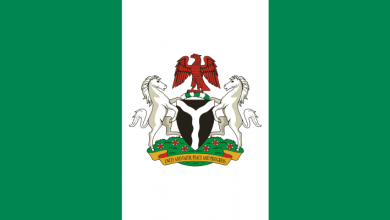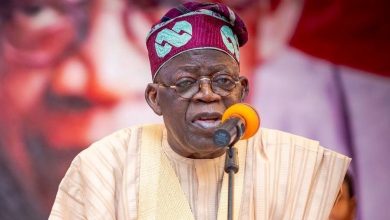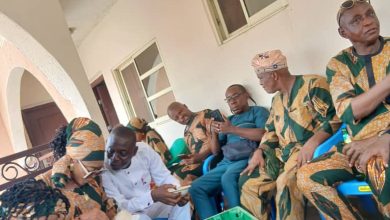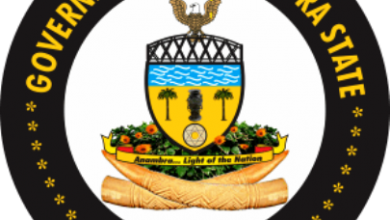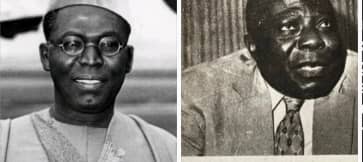
“Retired Justice [George] Sodeinde Sowemimo, Nigeria’s Chief Justice in the Second Republic made history in 1962 when at [the age of 42] his court sent Chief Obafemi Awolowo and some of his lieutenants in the defunct Action Group (AG) to jail for a plot to topple the Balewa Federal Government. Senior Staff Writer ONOISE OSUNBOR spoke with Justice Sowemimo on what some Nigerians saw as a controversial judgment, among others. EXCEPT.
Q: Did Chief Awolowo really plan to execute a coup?”
•
JUSTICE SOWEMIMO: “Since that trial, many of the persons involved have written what they regard as their own versions of the coup story. Awolowo himself came back and wrote his own. [Lateef] Jakande came and wrote his. Also [S. G] Ikoku, he came back and wrote a series of articles in the African Guardian magazine. His conclusion was that he was in charge in Ghana for the training of the Action Group stalwarts sent to him at that time. What the Action Group [AG] could have done as a body when their executive was charged to court was to admit that they really prepared [to carry out a coup]. But the military government in 1966 carried out what they [i.e., the AG] similarly had prepared. They being soldiers succeeded (first). But that they prepared, yes. Only that their own was not successful. But why go back into these things?”
II
Q: But they form part of Nigeria’s political history.
•
JUSTICE SOWEMIMO: “We must try to help by not reviving this history. The unfortunate thing is that the young ones will continue to argue, because they will conclude that the Judge [in Awolowo’s trial] was given money. But they did not read that (version) written by [S. G.] Ikoku who said they did plan it. But this was a man in charge in Ghana as the Secretary-General of the party there. He wrote how they prepared for it and said the thing never materialised. That was the truth. Not that somebody sat at the Bench and convicted him on lies.”
•
“What many have never given thought to is that confessional statements were made and documents tendered by Immigration Officers at the Idiroko border. Nobody asked, ‘what did you go to do at that period in Ghana’. Nobody questioned that. Ibrahim Imam, the first vice-president of the party, gave evidence and said that they prepared this thing. Those boys from the Mid-West, the Tiv boys, Tarka and others came and gave evidence. It was easy during the political period [i.e., the First Republic] to tell lies; to say, they just wanted to put people (Awo and others) in trouble. Now, the truth has come out. Now, everybody has learnt his lesson. No more coups. Leave that to soldiers to go on practising coups. The earlier they (the authors of the false stories on the case) save their children from lies, the better for them. Let them go and read Ikoku’s articles.”
•
“What Dr. Maja, the first prosecution witness said, nobody said a thing about it. He said they (the suspects) were all lined up by Chief Awolowo who told them to deny that they made confessional statements that Kwame Nkrumah [the Ghanaian Head of State] gave 60,000 pounds to him (Awolowo) in preparation for the coup.”
III
Q: “Since that celebrated trial, the issue has been that you were under pressure from the [Tafawa Balewa] government [to convict the defendants]. Is that true?”
•
JUSTICE SOWEMIMO: “There was no pressure from anybody.”
IV
Q: “How about the Awo people. Was there any effort to influence you not to imprison him?”
•
JUSTICE SOWEMIMO: “Look, the man is dead. One does not say something ill about dead people. You try to forget. If you are in a position to give judgment in an African community, there is always a tendency: you have pressures. But your own [as a judge] is to do that which is just; but you resist all. There must be pressures; you resist all, wherever they come. You can’t avoid it in an African community. We are still growing. May be in the course of time we will get over it.”
V
Q: “Sir, your statement at the trial where you said ‘My hands are tied’ has been very controversial. What did you really mean by the phrase?”
•
JUSTICE SOWEMIMO: “The man (Chief Obafemi Awolowo) said, ‘please, for God sake, release me, let me go away.’ I told him, I have jailed all the others. I have sentenced them to prison in a matter in which I found you are the leader who composed and did everything, and only got these chaps to take part. If I have jailed them, I can’t release you. I have done the judgment I can’t go back again. My hands are tied!’ But the people said, ‘Ah they have tied him with money.’ But they refused to state what Awolowo said. He was begging me! But I said, ‘how can I justify my conscience?’ But the next day, the Daily Express, the Daily Times and the Tribune carried it this way: ‘My Hands Are Tied by Government’. But what was their own gain if I jailed Awolowo or not?”
VI
Q: “You spoke before of the element of pressure in our African community. In view of this factor and your being a Yoruba man, have the Yoruba as a people found you a sell-out for jalling Awolowo their leader?”
•
JUSTICE SOWEMIMO: “When I was becoming a judge it was not because I was a Yoruba man. So what my look out? It’s all politics and they would want to twist everything. It was deliberate mischief. It was Justice [Sigismund Olanrewaju] Lambo who tried Anthony Enahoro [as one of the defendants], and nobody shouted. You know, at first Enahoro escaped [from Nigeria]. He was [later] extradited from London [to face his trial]. But Awo controlled the newspapers, The Tribune, Daily Express and others [at the time]. They were all Action Group papers. Whatever they printed was gospel truth.”
VII
Q: “Has there been a standing malice between you and the Awo followers?”
•
JUSTICE SOWEMIMO: “You cannot avoid that. Even though not in a particular way. I try to forget things. When Awolowo died, I wrote a condolence, message ‘One is sorry to learn of somebody who dies. May his soul rest in peace.’ But the Tribune [newspaper] was annoyed that I didn’t go [on] to say, ‘Africa has lost a great man. The Yorubas have lost a great leader.’ Because I jailed him. For not saying that the Tribune wrote what they wanted to write about me. That’s their own lookout. You just have to develop thick skin.”
VIII
Q: “Have you suffered any deprivations from society for being the Judge who jailed Awo?”
•
JUSTICE SOWEMIMO: “Can you help me out? Unless you can, then we [should] forget those things. Unless we forget, we can’t get out of it. When these people are in power they want you to know. But if you keep a straight mind that you did what is right you succeed unless you give way, then, you have yourself to blame.”
IX
Q: “In view of the controversial nature of that case, could you have refused to hear the case in your court?”
•
JUSTICE SOWEMIMO: “If you are a Judge you don’t distinguish between one case and another. If a case involved my brother I won’t do it. But none of those I tried was my brother . . . . You have to go through all the files and satisfy your conscience. So I read every statement [in the case files]. The whole thing was so plain. But for the fact that it has taken such a long time now, I cannot tell you from my head all what I came across in the statements. You see, the unfortunate thing you see among Nigerians is that because the man is a Yoruba, he should not convict another Yorubaman. Because he is [Igbo], he should not convict another [Igbo] man, and because he is Hausa, he should not convict another Hausaman. And we say we are equal to the white people! Do they do that in their countries? If Awo were convicted by a European, would you be shouting? Because I am a Yoruba man.”
X
Q: “Do you think that Awo’s trial had any effect on your career on the Bench until you retired?”
•
JUSTICE SOWEMIMO: “I became Chief Justice [of Nigeria]. It was not because of that. It was turn by turn. I went through the ropes. I became what I was destined to be. I did my work all along, became a [High Court] judge, then a Supreme Court judge, and then Chief Justice of Nigeria. Governments don’t control the judiciary.”
XI
Q: “If you were presented with that case again, would you take the same decision? Do you now regret jailing Awolowo?”
•
JUSTICE SOWEMIMO: “Never. If I sit on it again today, I will do the same thing.”
*SOURCE:*— AFRICAN CONCORD (12 February 1990) pp. 32-33.

